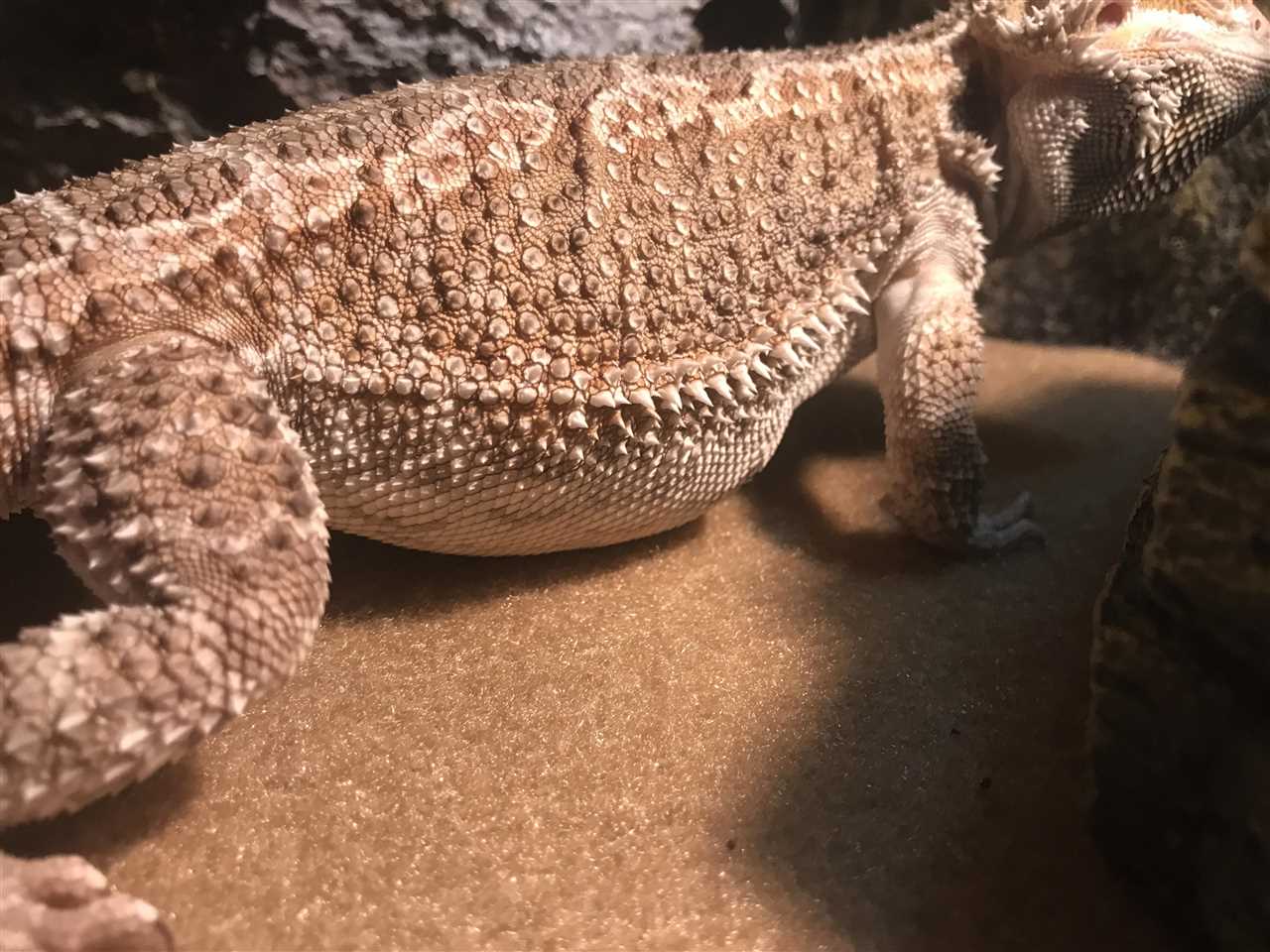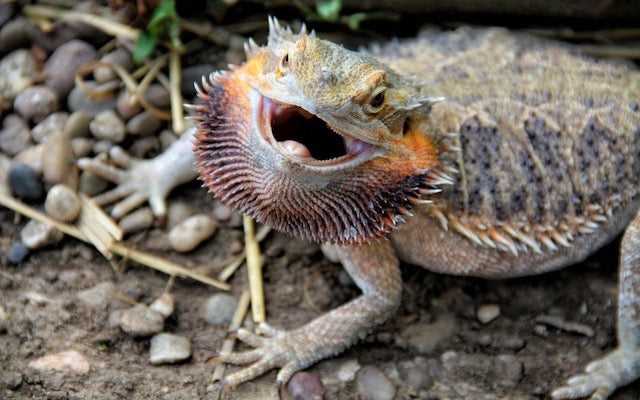
Bloat can occur in bearded dragons for several reasons. One possible cause is overeating. These reptiles have a hearty appetite, and if they are given excessive amounts of food, their digestive system may struggle to process it all. Additionally, a diet high in fatty foods can also contribute to bloat. Obesity is a risk factor for bearded dragons, and being overweight can put added pressure on their internal organs, leading to bloating.
Another cause of bloat in bearded dragons is gastrointestinal blockage. This can happen when the dragon ingests a foreign object that gets stuck in their digestive tract, preventing the passage of food and fluids. Common culprits include substrate material, such as sand or gravel, as well as small toys or other objects that may be present in their enclosure. Gastrointestinal blockage can be a serious issue and requires immediate veterinary attention.
If you notice that your bearded dragon appears bloated, it is essential to take action promptly. Ignoring the problem or delaying treatment can result in further complications and discomfort for your pet. Contact a reptile veterinarian who can provide a thorough examination and determine the underlying cause of the bloating. They may recommend adjusting the dragon’s diet, increasing hydration, or performing diagnostic tests to rule out any serious health issues.
Bearded dragon bloat is a condition that can affect these reptiles and can be potentially life-threatening if not addressed promptly. Bloat occurs when the stomach and intestines of a bearded dragon become filled with gas or fluid, causing the abdomen to become bloated. It can be caused by several factors, including:
Dietary Issues: A common cause of bearded dragon bloat is improper diet. These dragons require a balanced diet that consists of a combination of insects, vegetables, and fruits. Feeding them an excess of high-fat or high-fiber foods can lead to gastrointestinal issues and ultimately result in bloat.
Overfeeding: Overfeeding is another common cause of bloat in bearded dragons. These reptiles have a slower metabolic rate compared to other pets, and feeding them too much or too frequently can cause their digestive system to become overwhelmed, leading to bloat.
Poor Digestion: Certain factors can impair a bearded dragon’s digestion, such as a lack of dietary fiber, hydration, or gut motility issues. When digestion is compromised, food can remain undigested for an extended period, leading to gas buildup and bloating.
Parasites and Infections: Parasites, bacterial, or viral infections can also contribute to bearded dragon bloat. These organisms can disrupt proper digestion and cause inflammation in the gastrointestinal tract, leading to gas accumulation and bloating.
Stress: Like any other pet, bearded dragons can experience stress, which can affect their overall health. Stress can impact their appetite and proper digestion, potentially leading to bloat.
Recognizing the Symptoms of Bloat in Bearded Dragons
1. Swollen abdomen
A key symptom of bloat in bearded dragons is a swollen or distended abdomen. This can be caused by a build-up of gas or fluid in the gastrointestinal tract. You may notice that your dragon’s stomach looks unusually large or rounded, and it may feel firm to the touch.
2. Loss of appetite
If your bearded dragon suddenly loses interest in food, it could be a sign of bloat. Dragons with bloat may refuse to eat altogether or show a significant decrease in their usual appetite. This is because the bloating and discomfort make it difficult for them to digest their food properly.
3. Vomiting or regurgitation

4. Lethargy
A sluggish or lethargic behavior is another sign that your bearded dragon may be experiencing bloat. They may appear weak, uninterested in their surroundings, or reluctant to move. This lack of energy is often due to the discomfort and pain associated with bloat.
5. Difficulty breathing
In severe cases of bloat, bearded dragons may have difficulty breathing. This can be caused by the pressure from the bloated abdomen pressing against their respiratory system. You may notice your dragon struggling to breathe or breathing heavily.
If you observe any of these symptoms in your bearded dragon, it is crucial to seek veterinary care. Bloat can quickly worsen and lead to life-threatening complications. Your veterinarian will be able to properly diagnose the condition and provide appropriate treatment to relieve your dragon’s discomfort and restore their health.
Preventing Bloat in Bearded Dragons
Bloat in bearded dragons can be a serious and potentially life-threatening condition. Fortunately, there are several steps that you can take to help prevent bloating in your bearded dragon:
- 5. Provide proper temperature and lighting: Bearded dragons require a warm basking spot and UVB lighting to properly digest their food. Ensure that their enclosure is set up correctly with appropriate temperature gradients and proper lighting.
- 7. Encourage exercise: Regular exercise can help promote healthy digestion in bearded dragons. Provide them with plenty of space to move around and encourage them to climb, explore, and engage in natural behaviors.
- 8. Regular veterinary check-ups: Regular check-ups with a reptile veterinarian are important for the overall health and well-being of your bearded dragon. They can assess their diet, provide guidance on proper care, and spot any potential health issues before they become serious.
- By following these preventative measures, you can help reduce the risk of bloating in your bearded dragon and ensure that they remain happy and healthy.
Feeding Tips to Reduce the Risk of Bloat in Bearded Dragons
1. Offer a Variety of Foods
2. Gut Load Insects
Before feeding insects to your bearded dragon, it is essential to properly gut load them. Gut loading involves feeding the insects with nutritious foods that will pass on to your dragon when they eat them. This ensures that your dragon receives all the necessary nutrients without overwhelming their digestive system.
3. Dust Food with Calcium
Calcium is an essential mineral for the health of your bearded dragon. To help prevent bloat, you should dust their food with calcium powder before feeding. Calcium aids in digestion and prevents the formation of gas in the digestive tract.
4. Avoid Overfeeding
Overfeeding is a common cause of bloat in bearded dragons. It is crucial to feed your dragon an appropriate portion size based on their age and size. Be mindful not to offer too many insects or feed them large quantities of vegetables and fruits in one sitting.
5. Monitor Temperature
Maintaining the proper temperature in your dragon’s enclosure is vital for proper digestion. Bloating can occur if the temperature is too low, as it slows down the digestion process. Make sure to provide a basking spot with the ideal temperature range for your dragon’s species and monitor it regularly.
Treating Bloat in Bearded Dragons
Bearded dragons are prone to experiencing bloating, which can be a painful and potentially dangerous condition for them. If you notice that your bearded dragon is bloated, it is crucial to take immediate action to relieve their discomfort and avoid further complications.
1. Adjust their diet: Evaluate the bearded dragon’s diet and make necessary changes to prevent further bloating. Ensure that they are not consuming high-fat or high-fiber foods that can contribute to bloating. Stick to a well-balanced diet that consists of leafy greens, insects, and appropriate fruits.
2. Increase hydration: Proper hydration is essential to maintain the digestive health of your bearded dragon, so make sure they have access to fresh and clean water at all times. You can also provide a shallow water bowl for them to soak in, which can aid in digestion and relieve bloating.
3. Encourage movement: Regular physical activity can help stimulate digestion and alleviate bloating in bearded dragons. Provide them with a spacious and stimulating habitat where they can explore, climb, and exercise. Engage in supervised outside time to allow for natural sunlight exposure and encourage movement.
4. Supportive care: To ease their discomfort, you can gently massage their abdomen in a clockwise motion. This can help stimulate digestion and relieve any gas build-up. Be sure to use gentle pressure and movements to avoid causing any pain or distress to your bearded dragon.
5. Temperature regulation: Maintaining the appropriate ambient temperature is crucial for bearded dragons’ digestive health. Ensure that their enclosure is warm enough for proper digestion, but not excessively hot as it can cause further distress and aggravate bloating. Use a reliable thermometer to monitor and adjust the temperature accordingly.
6. Avoid medication: While it may be tempting to administer over-the-counter medication to alleviate your bearded dragon’s bloating, it is crucial to avoid doing so. Medications designed for humans or other animals can be harmful or fatal to bearded dragons. If the bloating persists or worsens, consult a reptile veterinarian for appropriate treatment.
7. Consult a veterinarian: If your bearded dragon’s bloating does not improve with home-care measures or if their condition worsens, it is essential to seek veterinary care promptly. A reptile veterinarian will be able to assess your bearded dragon’s health, provide appropriate treatment, and address any underlying causes of bloating.
Seeking Veterinary Care for Bloat in Bearded Dragons

When you notice any of the symptoms of bloat in your bearded dragon, including a distended abdomen, loss of appetite, lethargy, and difficulty breathing, it is essential to take them to a reptile veterinarian as soon as possible.
Choosing a Reptile Veterinarian
Ensure that the veterinarian has experience in diagnosing and treating bloat in bearded dragons. They should have access to proper diagnostic equipment and be knowledgeable about reptile anatomy and physiology.
Diagnostic Tests

When you bring your bearded dragon to the vet, they will likely perform a physical examination and may request additional diagnostic tests to confirm the presence of bloat. These tests may include X-rays, blood tests, and fecal examinations.
The purpose of these tests is to rule out any other underlying medical conditions and to determine the severity of the bloat. This information is vital for the veterinarian to develop an appropriate treatment plan for your bearded dragon.
Treatment Options
The specific treatment for bloat in bearded dragons will depend on the severity of the condition and any underlying causes that may have contributed to the bloat. Your veterinarian may administer fluid therapy to rehydrate the dragon, as well as medication to relieve any pain or discomfort.
In some cases, surgical intervention may be necessary to relieve pressure on the intestines or stomach. The veterinarian will discuss all treatment options with you and determine the best course of action based on your dragon’s individual circumstances.
Post-Treatment Care
Regular follow-up visits will likely be scheduled to monitor your bearded dragon’s progress and make any necessary adjustments to the treatment plan. Be sure to ask your veterinarian any questions you may have and seek their guidance if you notice any new or ongoing issues.
| Summary | Bloat in bearded dragons can be a serious and potentially life-threatening condition. Seeking veterinary care promptly is crucial for the well-being of your dragon. Find a reptile veterinarian experienced in treating bearded dragons and follow their recommended diagnostic tests and treatment options. Follow post-treatment care instructions carefully to ensure your dragon recovers fully. |
|---|
